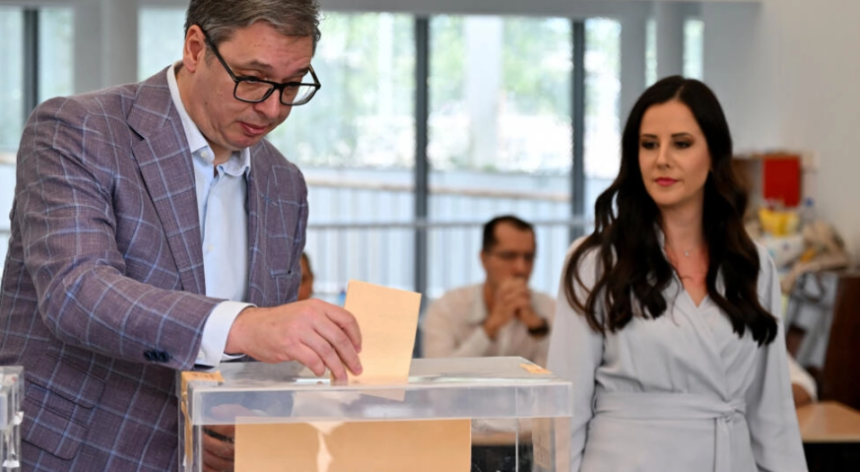Serbia’s ruling nationalist party, led by President Aleksandar Vucic, claimed victory in the capital Belgrade on Sunday in a rerun of local elections. This comes nearly six months after allegations of fraud in a previous poll sparked weeks of protest.
While official results are yet to be announced, Vucic asserted a commanding victory for his Serbian Progressive Party (SNS) in the capital and almost all other municipalities where votes were held. In the December vote, the SNS had narrowly secured 49 seats in the city council but was unable to form a municipal government, leading to the decision for a new election.
“We had a majority even after December 17 in Belgrade. But we felt that wasn’t enough legitimacy because some others didn’t want to form a coalition with us. Now, we will have 62 or 63 seats” out of 110 on the city council, Vucic said on Sunday.
Shortly after Vucic’s speech, fireworks echoed through the capital, marking a celebratory atmosphere for the ruling Serbian Progressive Party (SNS). Preliminary results, based on exit polls from the Center for Free Elections and Democracy (CeSID) and Ipsos, indicated that the SNS secured 53 percent of the vote in Belgrade, with the opposition newcomer Kreni Promeni (“Go for Change”) following with 17 percent.
Turnout appeared lower than in December, with 37 percent of voters in the capital casting their ballots two hours before polls closed, compared to over 45 percent in the previous election. This time, the SNS faced a divided opposition, with some boycotting the vote while others attempted to attract voters. Despite the satisfaction expressed by Savo Manojlovic, leader of Go For Change and its Belgrade mayoral candidate, he added a sobering note, stating, “We have nothing to celebrate in a country with such electoral conditions.”
“This is a great success for these people, all the supervisors, candidates, and supporters who stood by us in impossible conditions with a budget where we didn’t have a single billboard”, Manojlovic said.
Reports of irregularities marred the local elections in Serbia on Sunday, with local NGOs CRTA and CeSID documenting numerous issues such as vote-buying and double registration of voters.
Observers from the Organization for Security and Cooperation in Europe (OSCE) are set to release their initial report on Monday morning. Opposition activists took to social media to accuse the ruling Serbian Progressive Party (SNS) of orchestrating a call centre to purchase votes in Novi Sad, Serbia’s second largest city.
Clashes reportedly erupted when activists attempted to enter the building, leading to the use of tear gas. These allegations come in the wake of similar irregularities reported during the December polls, which saw protests outside government offices. Despite opposition efforts to annul the vote, Serbia’s top court rejected their move.
President Vucic has employed an ultra-nationalist rhetoric to galvanize support for the Serbian Progressive Party (SNS), particularly in response to a recent UN General Assembly vote establishing an annual day of remembrance for the 1995 Srebrenica genocide.
Vucic, who attended the vote in New York draped in a Serbian flag, vehemently opposed the resolution, arguing it would “open old wounds” and cause “complete political havoc.” In an effort to prevent potential electoral fraud, legislation was passed in May, with opposition support, to prohibit individuals who have changed residences within the past year from voting in their new constituency.
This legislation was prompted by allegations in December of Serbs from neighboring Bosnia being transported to Belgrade to vote illegally. The controversy surrounding the previous vote has seemingly dampened campaigning efforts and public enthusiasm for the current elections, with some noting a greater emphasis on boycotting rather than participating in the electoral process.



